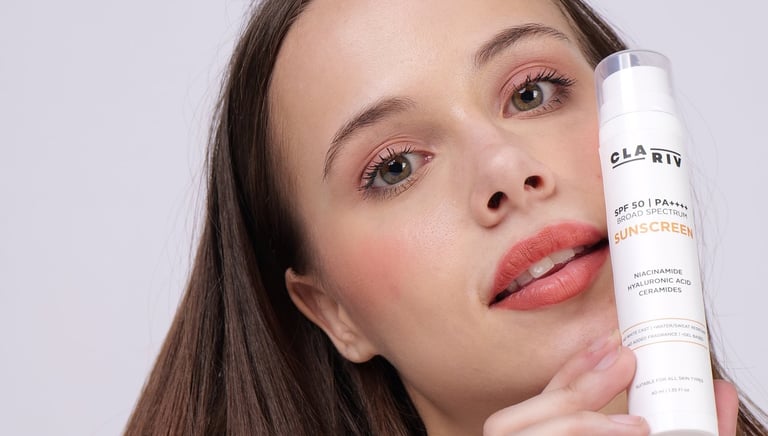FIRST TIME BUYER ? - Use Code FIRSTTIME to enjoy 5% additional discount on entire store
Why Sunscreen Matters Even in Winter
UV rays don’t stop in winter! Learn why sunscreen is essential year-round and how it protects your skin from pigmentation, dullness, and early aging.
11/12/20253 min read


Sunscreen Isn’t Just for Summer — Here’s Why You Need It All Year Round
When the weather turns cool and the sun feels soft, most people stop using sunscreen. After all, it’s winter — and cloudy days can’t possibly harm your skin, right?
Not quite. The truth is, UV rays don’t take a break just because the temperature drops. Even in winter, they silently damage your skin — leading to pigmentation, dullness, premature aging, and dark spots that can worsen over time.
That’s why dermatologists insist on one thing: sunscreen should be your skin’s year-round companion, no matter the season.
Let’s dive into the science of why sunscreen still matters in winter — and how choosing the right one can protect your skin from long-term damage.
1. UV Rays Don’t Disappear in Winter
The sun emits two main types of UV rays — UVA and UVB.
UVB rays are responsible for tanning and sunburn.
UVA rays penetrate deeper into the skin and cause pigmentation, wrinkles, and early signs of aging.
While UVB rays reduce slightly in winter, UVA rays remain almost constant throughout the year — even on cloudy or cold days. These UVA rays are powerful enough to pass through glass windows, meaning your skin is exposed whether you’re outdoors or sitting by a sunny window.
In short: You may not feel the sun’s heat in winter, but your skin still feels its harmful effects.
2. Winter Sun + Pollution = Pigmentation Trigger
In Indian cities, pollution levels peak during winter — and when UV rays mix with polluted air, it leads to a spike in oxidative stress on your skin.
This stress accelerates melanin production, the same pigment responsible for tanning and dark spots. If you already have pigmentation, the winter sun can actually make it worse without proper protection.
That’s why pairing your anti-pigmentation serum with a high-protection sunscreen is essential to maintain your results.
Using a sunscreen daily helps prevent new pigmentation while your serum works to fade the old ones.
3. Snow and Clouds Don’t Block UV — They Reflect It
If you live in or visit colder regions, here’s something surprising: snow can reflect up to 80% of UV rays back onto your skin. That means you get double exposure — from above and below.
Similarly, clouds only block about 20% of UV radiation. The rest passes right through, which is why people still get tanned or sunburned on overcast winter days.
Dermatologists call this “the winter sun trap” — when skin damage happens silently because you underestimate the UV intensity.
4. Winter Dryness Makes Skin More Vulnerable
Cold air and indoor heating strip your skin of moisture, making it dry and sensitive. Dry skin is more prone to irritation and inflammation caused by UV rays.
A good sunscreen with hydrating ingredients like Vitamin E or Aloe Vera Extract helps protect and soothe your skin barrier through the season.
When your skin barrier stays strong, your anti-pigmentation treatments work more effectively too.
5. Sunscreen Supports Your Skincare Investments
If you use serums like Vitamin C or Anti-Pigmentation formulas, sunscreen isn’t optional — it’s non-negotiable.
These serums make your skin more photosensitive as they increase cell turnover and fade pigmentation. Without sunscreen, the UV exposure can reverse all your progress — causing new dark spots or uneven tone.
Think of sunscreen as the “shield” that protects your skincare investment and locks in the benefits of your daily routine.
6. Choose the Right Sunscreen for Winter
Winter calls for a sunscreen that’s lightweight, hydrating, and non-greasy — one that won’t leave a white cast or make your skin feel heavy.
Look for these features when choosing your sunscreen:
SPF 50 and PA++++ protection for both UVA & UVB rays
Mineral-based formula (safer for sensitive or acne-prone skin)
Matte or velvet finish for a clean, natural look
Hydrating ingredients to balance winter dryness
A formula that checks all these boxes ensures you’re protected without feeling sticky or oily — even under moisturizer or makeup.
7. How to Use Sunscreen Effectively in Winter
To make the most of your sunscreen:
Apply every morning, even if you’re staying indoors.
Use two finger-lengths of product for the face and neck.
Apply it after moisturizer and before makeup.
Reapply every 3–4 hours if you’re outdoors or exposed to sunlight through windows.
Bonus Tip: Pair it with your CLARIV Anti-Pigmentation Serum in the morning routine for the perfect protection + treatment combo.
8. Sunscreen Is the Foundation of Healthy Skin
No matter how advanced your skincare routine is, it won’t work without sunscreen. From fading pigmentation to preventing new damage, SPF is the foundation of youthful, glowing skin — in summer, monsoon, or winter.
Your serum repairs your skin.
Your moisturizer hydrates it.
But only sunscreen protects it — all year long.
The Bottom Line
The chill in the air may fool you into thinking your skin is safe — but UV rays are constant companions. Applying sunscreen daily, even in winter, ensures your skin stays healthy, bright, and protected.
With consistent use, you’ll notice:
Fewer new dark spots
More even tone
Long-lasting glow
Better serum results
Sunscreen isn’t just a product — it’s your skin’s best defense.
✨ Stay protected this winter!
Add a high-performance SPF to your daily routine and keep your glow protected — every day of the year.
Pair it with CLARIV Anti-Pigmentation Serum for complete defense against dark spots and uneven skin tone.
👉 Explore the skincare collection at www.clariv.in
info@clariv.in
+91-92204-02087
